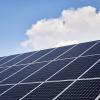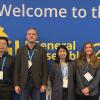
The Anniversary Fund of the Oesterreichische Nationalbank (OeNB) funded a new project on the Macroeconomic Effects of Digitalisation in Austria (W4.0) of the ASA-EM research group.
At present, our society is widely believed to be in the fourth industrial revolution. The digitization of the economy as a whole, which is referred to as "Industry 4.0" (I4.0) or (including services) as "Economy 4.0" (W4.0), will decisively change the economy. On the one hand, jobs will be replaced by automation, on the other hand, jobs will be created through growth effects and new occupations.
Recently, the debate has been fuelled by empirical studies for the US and Europe arguing that a substantial share of jobs is at “risk of computerization”. A host of recent empirical studies estimate that computer technologies put anywhere from 9% of jobs to 47% at risk of automation in the near future (see, for example, Arntz et al. (2016), Frey and Osborne (2017)). Thus, there is a widespread concern today that many jobs will be lost to these computer technologies as more human tasks can be performed by machines. Surprisingly, the wider consequences to societies and the economy are less investigated. Up to now, almost no studies exist that investigate the macroeconomic consequences of automation.
To study the economy-wide consequences of automation, we will use the IIASA macroeconomic agent-based model, which is able to compete with standard models (econometric and DSGE) in out-of-sample forecasting. The aim of the model-based analysis is to estimate the net employment effects and the macroeconomic effects of digitization in Austria in general by means of scenario analysis until 2035, as well as an evaluation of possible policy options.
The W4.0 project was funded together with 19 research projects (38 applications) with a total funding sum of EUR 3.5 million by the Anniversary Fund of the Oesterreichische Nationalbank (OeNB) in the first decision meeting in 2022. The Anniversary Fund was established in 1966 to mark the bank’s 150th anniversary. Since then, it has provided a total of 10,100 projects in basic Research with funding of some EUR 825 million.
News

29 April 2024
Think globally, act locally: IIASA completes PV system installation

23 April 2024
FLAM Goes EGU: Exploring Wildfire Research in 2024

22 April 2024
